Unit_2_What_should_I_doAqnUwP
八年级英语下册Unit_2_讲义what_should_i_do公开课课件ppt
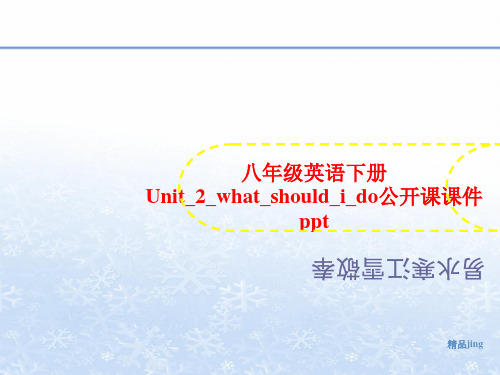
about new treatments c. Worked with soldiers in the First World War d. Invented medical tools to use outside hospital e. Came to China f. Died
IV. Memory Challenge:
See who has a good memory.( T or F)
8. He opened hospitals to train
doctors and nurses. T
9. He wrote books to make money.
10. When he was tired, he
army Canada China doctor hospital medical soldier travel treatment
Reading:
I. Watch and listen:
II. Read the text quickly, then put the events in the correct order.
5. He went to the front to look after injured soldiers in the
Anti-Japanese War. F 6. He invented new treatments to help himself. F 7. He came to China in 1938 and he worked very hard. T
4. Why did Bethune die in the end? He died because he did not stop to take care of his hand.
八年级英语下册-unit2-What-should-I-do整单元课件-人教新目标版
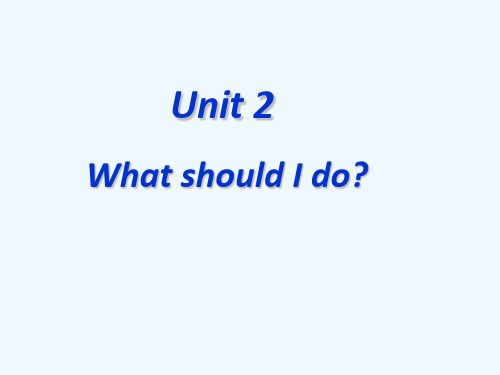
argued with
What's wrong? What should she do?
What's wrong? What’s the matter? What should she do?
...plays his CDs too loud
A: What's wrong? B: My clothes are out of style. A: Maybe you should buy some
Everybody has his or her problems.
I have mine. What's it? My mom plays music too loud. I can't stand it at all. What should I do? You should...
play v.播放
2a Listen. Peter's friend is giving him advice. Circle the word "could" or "should".
____________________
give him a call ______________ phone him
__________________________
2b Listen again.
Why doesn’t Peter like his friend’s advice?
Draw lines to match the advice with the reasons.
Advice
1. You could write him a letter. 2. Maybe you should call him up. 3. You should say you’re sorry. 4. Maybe you could go to his house. 5. You could give him a ticket to a ball game.
八年级英语下册Unit2WhatshouldIdo教案人教新目标版
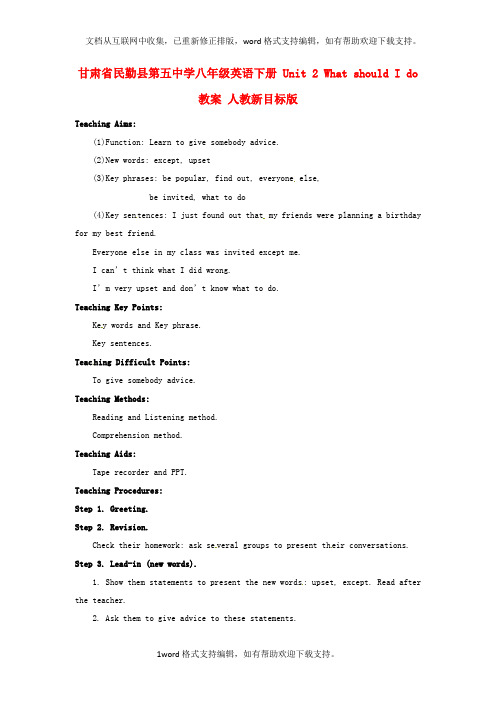
甘肃省民勤县第五中学八年级英语下册 Unit 2 What should I do教案人教新目标版Teaching Aims:(1)Function: Learn to give somebody advice.(2)New words: except, upset(3)Key phrases: be popular, find out, everyone else,be invited, what to do(4)Key sen tences: I just found out that my friends were planning a birthday for my best friend.Everyone else in my class was invited except me.I can’t think what I did wrong.I’m very upset and don’t know what to do.Teaching Key Points:Ke y words and Key phrase.Key sentences.Teac hing Difficult Points:To give somebody advice.Teaching Methods:Reading and Listening method.Comprehension method.Teaching Aids:Tape recorder and PPT.Teaching Procedures:Step 1. Greeting.Step 2. Revision.Check their homework: ask se veral groups to present th eir conversations. Step 3. Lead-in (new words).1. Show them statements to present the new words: upset, except. Read after the teacher.2. Ask them to give advice to these statements.Step 4. Reading.1. Today, we’ll talk something about a lonely kid, he has a problem and writes to an advice column for help. Firstly, listen to the tape and complete the letter.2. Correct the ans wers (with simple explanation).3. Read the letter carefully and underline: What’s wrong with the lonely kid? Ask a stud ent to read the letter for the others.4. After their reading, correct the answer, and try to explain the language points: find out, excet, else, what to do.5. Fast reading and then do T or F.6. Correct their answers.Step 5. Writing.1.We’ve found out the lonely kid’s problem, please write a letter to him and give him some advice? If you were Mary, write to him.2. Think of some advice, and discuss.3. Write to him with your advice.4. Ask someone to read their letters.Step 6. Summary and Exercises.1. We can’t work out the problem. Can you tell us _____ ?A: how to do B: what to do itC: how to do it D: what should to do2.Most students wouldn’t like to have the same haircut ___ others.A: like B: as C: so D: with3.Please _____ who broke the window.A: find out B: find C: look for D: look out4.The boy _____ his coat here and forget it home.A: left;took B: left;to takeC: forgot;brought D: forgot;to bring5.Can you invite Mary _____ tennis with us ?A: to play B: plays C: playing D: play6.I wanted to know _____ last weekend.A: what Mary does B: what does Mary doC: what Mary did D: what did Mary do7.What _____ do you have to do at home?A: the others B: else C: the other D: other8.—All the students went to the park _____ Sally. Why?—Because she was ill in bed.A: except B: besides C: beside D: expect9.Only I wasn’t invited in my class.(同义句)Everyone _____ in my class was invited _______ me.10.Mary didn’t know how she should learn Chine se well.(同义句)Mary didn’t know _____ _____ learn Chinese well.Step 7. Homework.1. Complete 3b and then write a letter about what we could do to help the students who are not good at English.2.Self-check。
八年级英语下册《Unit 2 What should I do Period 1 Section A(1a-2c)》教案 人教新目标版

5. Wait until next year .
Practice reading the advice by the Ss .
3.While-task
SB Page 10 ,1a.
1. Read the instructions to the Ss . 2. Read the problems by the Ss .
. Main Points
Learn to give advice using“could should shouldn’t”
.Difficult points
How to improve the students listening ability.
.Teaching Method
Task-based teaching method ,Listening and speaking method.
(2.)情态动词could should的用法。
(3.)Why don’t you…?结构表建议的运用。
(4)What’s wrong with sb.?的用法。
2.Ability aims:
(1)能用could should谈论问题。
(2)能用Why don’t you…?结构表建议。
3.Emotion aims: To enjoy they have trouble.
Summary
1.Go over the key words.
2.Revise the main sentences such as:
-What should I do?
-You should write a letter.
unit-2aWhat-should-I-do市公开课一等奖课件名师大赛获奖课件
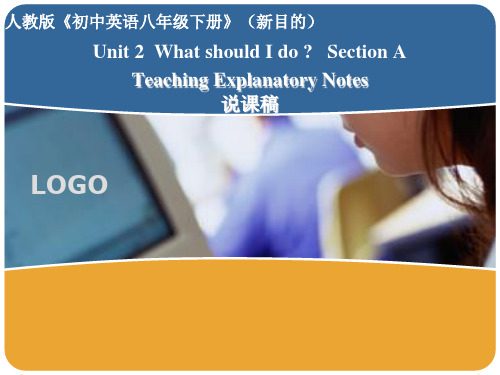
A: What’s the matter, Peter?B: I had an argument with my best friend. What _________I do?A: Well, you _________ write him a letter.B: I don’t think so. I don’t like writing letters.A: Maybe you ________ call him up.B: No, I don’t want to talk about it on the phone.A: Well, you _________ say you’re sorry.B: Yes, I know I _______, but it’s not easy.A: Maybe you _________go to his house.B: I guess I ________, but I don’t want to surprise him.A: Hey, I know. You _______ give him a ticket to a ball game.B: Well, that’s a good idea, but I don’t have enough money.
Advice
Reasons
a. It’s not easy.b. I don’t have enough money.c. I don’t want to surprise him.d. I don’t like writing letters.e. I don’t want to talk about it on the phone.
情感态度与文化意识目的 1、激发并提高学生学习英语的爱好,主动参加教学各环节,成为学习的主人,体现课堂教学”主体者”的身份。 2、激发和培养学生丰富的想象力和发明力。 3、增进师生间的彼此沟通和理解。 4、加强学生的团体协作精神。
【八年级】Unit 2 What should I do

【八年级】Unit 2 What should I doUnit 2 What should I do?(预习暨集体备)单元教材分析学会should ,Why don’t you和 could在英语中的习惯用法。
使用这些习惯用法,就自己生活、学习中存在的某些实际问题提出建议;拒绝、接受别人的建议。
在学习贴近学生生活实际的语言知识的同时,特别关注学生生活和学习中的真实困难和烦恼。
进一步引导学生对自我和周围世界进行比较客观的认识、评价,发展学生主动解决问题的自我意识和行为能力。
发展学生与人和谐交往的能力;培养在学生交流中寻求帮助。
既坚持自己观点、又听取别人建议。
单元预习目标1知识目标:学会使用情态动词should、could,学习并使用新单词1. The students will learn to talk about problems.2. The students can help people in trouble and how to give advice.3. Practice the sentences with “could, couldn’t, shouldn’t”.4. To learn the words and expressions about reading passage.2能力目标:(1)能够谈论自己的麻烦和问题。
(2)能够为他人的问题找到合理的解决办法,提出相应的建议。
(3)能够从他人的建议中为自己的问题找到解决办法。
3情感目标:通过共同探讨、解决各种烦恼和困惑,学会反思自己,体谅他人,树立合作精神,培养积极乐观的情感态度。
单元预习重难点一览重点难点1.词汇:serious, stereo, loud, argue, could, argument, either,bake, teen, family, tutor, original, trendy, haircut, caller, except, upset, lose, aunty, fight2.词汇: out of style, keep out, call up, pay for, ask for, the same as, at school, leave out, get on well with, look for, want sb to do sth, argue with, write sb a letter, a ticket to a ball game, have a bake sale, get a tutor, find out, invite sb to do sth, leave… at home, be angry with, give sb some advice3.句型:What’s wrong?y parents want me to stay at home every night.y brother plays his stereo too loud.What should I do?Why don’t you talk to him about it?You could give him a ticket to a ball game.I think you should ask your parents for some money.y friend wears the same clothes and has the same haircut as I do.1.语法:could, should的用法。
人教新目标英语八下Unit2WhatshouldIdo教案13
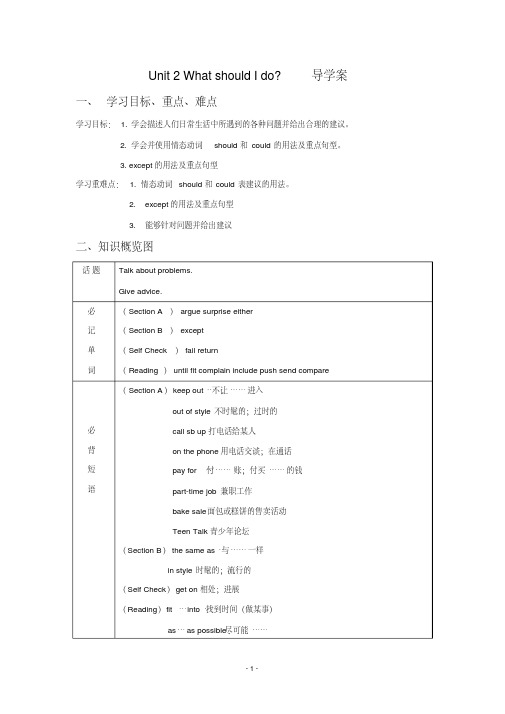
Unit 2 What should I do?导学案一、学习目标、重点、难点学习目标: 1. 学会描述人们日常生活中所遇到的各种问题并给出合理的建议。
2. 学会并使用情态动词should和could的用法及重点句型。
3. except的用法及重点句型学习重难点: 1. 情态动词should和could表建议的用法。
2. except的用法及重点句型3. 能够针对问题并给出建议二、知识概览图话题Talk about problems.Give advice.必记单词(Section A)argue surprise either(Section B)except(Self Check)fail return(Reading)until fit complain include push send compare必背短语(Section A)keep out…不让……进入out of style不时髦的;过时的call sb up打电话给某人on the phone用电话交谈;在通话pay for…付……账;付买……的钱part-time job兼职工作bake sale面包或糕饼的售卖活动Teen Talk青少年论坛(Section B)the same as…与……一样in style时髦的;流行的(Self Check)get on相处;进展(Reading)fit…into…找到时间(做某事)as…as possible尽可能…… all kinds of 各种各样的on the one hand(在)一方面on the other hand在另一方面日常用语My brother plays his CDs too loud. What should I do?我哥哥播放CD的声音太大了。
我该怎么办?You should say you’re sorry.你应该说对不起。
You could write him a letter.你可以给他写一封信。
英语人教版八年级下《Unit2WhatshouldIdo》教案1

八年级下英语第7课时【课题】:Unit 2 Whwt should I do ?Section A 1a---2c【励志小木屋】:Perfection does not exist---- you can always do better and you can always grow.完美并不存在---你总可以做得更好,总是可以成长。
【预习目标】:1.识记P10-11 单词及短语。
2. 运用What’s rong?My clothes are out of style.谈论在学校和家庭中遇到的麻烦和问题。
3.会使用What should I do ? You should ... 提出相应的建议。
4.通形成较好的人际交往能力。
【预习重难点】:重点目标2 难点目标3一、自主预习(一)预习任务 1.写出下列单词播放 _______ 争吵________ 错误的_______ 票________使惊奇________2 英汉互译1 .想让某人做某事_______________ 2.足够的钱__________3.和某人争吵__________________4 .使某人吃惊_____ 5.out of style ___ 6.keep out _____7. call sb. Up___ 8.on the phone(二)预习诊断从方框中选择适当的词补全对话。
A: What’s ___1____ ?B: My clothes 2 out of style .A: 3 you 4 buy some new clothes .B: I don’t have 5 money .B: That’s a good idea .(三)预习反思Do you have any questions ?二.课中实施Step 1 预习交流------ 精讲点拨1.I don’t have enough money .enough 修饰名词时置于名词前,修饰副词时置于副词后。
人教版八年级英语下册《nit 2 What should I do. Unit 2 What should I do.(通用)》教案_0

人教版初二八年级下册英语《Unit 2 What should I do》一、教学课题:unit2 what should i do?the first period二、教学设计思路:结合多媒体,利用图片、实物、简笔画等帮助学生记忆本节相关词汇;设置情境,帮助学生通过听说练习学会谈论日常问题及给出建议。
三、教材分析:in this unit students learn to talk about problems at school and at home and how to give advice to solve them. the first period serves as an introduction and lead-in part. activity 1a introduces some key vocabulary. activity 1b gives students practice in understanding the target language in spoken conversation. activity 1c gives students an opportunity to practice their speaking skill using the target language. in this period students can learn to explain their problems in their daily life.四、教学目标:(一)知识目标1. key vocabulary:keep out; play; argue; wrong; what’s wrong?; style; out of style2. key structures:what’s wrong?my clothes are out of style.maybe you should buy some new clothes.(二)能力目标to train students’ a bility of communication and listening skill.(三)情感目标1. to be interested in taking part in all kinds of activities in an english class.. 培养学生良好的合作意识,鼓励学生大胆表达自己的想法和意愿。
人教版八年级英语下册《nit 2 What should I do. Unit 2 What should I do.(通用)》教案_7
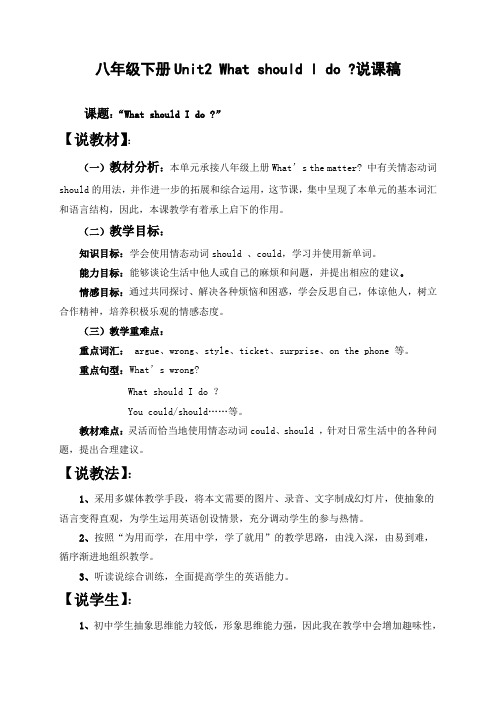
八年级下册Unit2 What should I do ?说课稿课题:“What should I do ?”【说教材】:(一)教材分析:本单元承接八年级上册What’s the matter? 中有关情态动词should的用法,并作进一步的拓展和综合运用,这节课,集中呈现了本单元的基本词汇和语言结构,因此,本课教学有着承上启下的作用。
(二)教学目标:知识目标:学会使用情态动词should 、could,学习并使用新单词。
能力目标:能够谈论生活中他人或自己的麻烦和问题,并提出相应的建议。
情感目标:通过共同探讨、解决各种烦恼和困惑,学会反思自己,体谅他人,树立合作精神,培养积极乐观的情感态度。
(三)教学重难点:重点词汇: argue、wrong、style、ticket、surprise、on the phone 等。
重点句型:What’s wrong?What should I do ?You could/should……等。
教材难点:灵活而恰当地使用情态动词could、should ,针对日常生活中的各种问题,提出合理建议。
【说教法】:1、采用多媒体教学手段,将本文需要的图片、录音、文字制成幻灯片,使抽象的语言变得直观,为学生运用英语创设情景,充分调动学生的参与热情。
2、按照“为用而学,在用中学,学了就用”的教学思路,由浅入深,由易到难,循序渐进地组织教学。
3、听读说综合训练,全面提高学生的英语能力。
【说学生】:1、初中学生抽象思维能力较低,形象思维能力强,因此我在教学中会增加趣味性,增添形象性,充分调动学生的兴趣,寓教于乐。
2、一部分学生胆小、羞涩,在教学中我要鼓励学生大胆开口,积极参与,增强学习的信心。
3、生活中,学生会遇到一些麻烦和问题,在教学中我会引导学生关注这些问题,并帮助他们找到解决这些问题的有效途径。
【说教学过程】:教学过程按照以下环节完成:1、开心一刻,寓教于乐;2、创设情景,授新单词;3、在运用中学习使用情态动词could、should;4、听读说综合训练;5、联系实际,巩固运用;6、布置作业;7、板书设计。
八年级英语Unit 2 What should I do 人教新目标版知识精讲

八年级英语Unit 2 What should I do? 人教新目标版【本讲教育信息】一、教学内容:Unit 2 What should I do?(一)语言目标:Talk about problems; Give advice(二)目标语言:—What should I do?—You should/could write him a letter.(三)重点词语讲解1. What should I do?should 是一个情态动词,表示义务、责任或劝告,建议等,意为“应该,应当”,后接动词原形。
ex: (1) We should help him.(2) You should ask her first.(3) You (不应该) laugh at him.(4) What should we do now?should还可用来表示可能性、推测或推论。
The movie should be interesting.That exciting.(应该是)2. My brother plays his CDS too loud.此句中的play意为“播放”;loud 在此句中用作副词,意为“大声地”,相当于loudly. loud 也可用作形容词,意为“响亮的,吵闹的”,用作定语或表语。
ex:①I heard a knock at the door.(我听到有人大声敲门。
)=I heard someone knock at the door.②Please ask them to speak more .(请他们讲话大声点。
)3. You could call him up.could 在句中表示建议,意为“可以”,表示一种委婉的语气,并非过去式,其否定形式为couldn’t。
ex: (1) If you are tired, you could go to bed early.(2) You could be more careful. (你可以再仔细些。
八年级英语新目标下_Unit_2_What_should_I_do

Unit 2 What should I do ?Language goal: Talk about problems and give advice. 谈论问题和提出建议。
语法:学会使用could,should提出建议。
SectionA Period 1课前预习内容阅读教材第10页和第11页重点词汇和短语记忆(看教材104页)播放争论,争吵使惊奇,使意外 wrong ticket 不让….进入不时髦的,过时的call sb. up on the phone提示1.---My clothes are out of style. 我的衣服过时了。
---Maybe you should buy some new clothes. 也许你该买几件新的了。
2.---What should I do? 我该如何是好呢?---You could write him a letter. 你可以写封信给他。
要求试做练习1a(看这些问题。
他们严重与否?将他们写到相关的表格里。
)1c和2c。
知识点拨enough a. 修饰名词,放在它所修饰的名词之前,也可放在它所修饰的名词后,意为“足够的,充足的”。
你有足够的时间做这件事。
You have enough time ( time enough ) to do it.他有足够的钱买那本书。
He has for the book.b. enough修饰形容词或副词放在形容词或副词之后,意为“足够地,十分地”。
这个房间足够大可容两个人住。
The room is for two people to live in.他跑得够快吗? Did he run ?c. enough….to….足够……可以…..那个女孩足够大可以去上学了。
The girl is old enough to go to school.这个箱子足够轻,你可以搬动它。
(light:轻的)The box is for you carry.What’s wrong? 怎么了?What’s wrong?是用来询问别人发生了什么事最常用的句型之一。
人教版八年级英语下册《nit 2 What should I do. Section A》教案_22

新目标英语八年级下Unit 2 What should I do?Section A教学设计一、教材分析本课是新目标英语八年级下册Unit 2 What should I do?第二单元第一课时,本单元主要围绕“我该怎么办”这个话题展开教学,通过本单元教学,帮助学生掌握怎么样谈论问题及提出建议。
二、教学目标根据教学大纲的要求和教学内容的特点,本节课特制定以下教学目标:(1)知识目标a. 掌握以下单词:keep out, play, loud, argue, wrong, What's wrong ? out of style, could, should, call sb. up, ticket, surprise, on the phone, What’s the matter?b. 掌握情态动词should,could和shouldn’t的用法,并能运用What should I do? You could/should …或Maybe you could/should…的句式进行提问和应答。
c. 能用英语谈论问题及提出合适的意见。
(2)能力目标:培养学生用英语思维的能力和初步运用英语交际的能力,使学生能够在相似生活情景中运用所学语言,达到交流的目的。
(3)德育目标:通过与他人互相谈论麻烦和提出建议,来表达了解、关心别人,并增进友谊。
三、教学重点(1)掌握本课的生词、短语和本课所出现的日常交际用语。
(2)掌握有关于怎么样谈论问题和提出建议:What should I do? You could/should …或Maybe youcould/should…四、教学难点(1)谈论问题: What’s wrong? / What’s the matter? / What’s your trouble?(2)给出建议: should, shouldn’t, could, why don’t you...?, Why not?五、教学方法在进行具体教学时,教学方法不是固定不变的,教学方法具有灵活性、多样性、发展性和补偿性,选择和采用教学方法,不仅要依据学科的知识特点,而且要根据教学任务和学生的年龄特点及学生的实际水平选用。
人教版八年级英语下册《nit 2 What should I do. Unit 2 What should I do.(通用)》教案_4
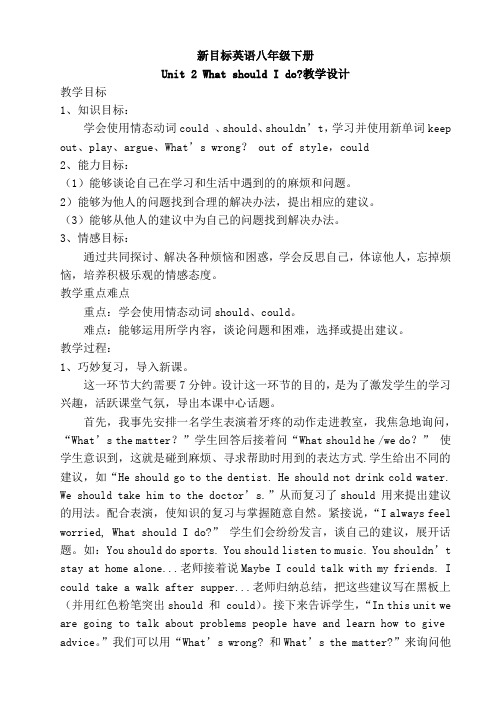
新目标英语八年级下册Unit 2 What should I do?教学设计教学目标1、知识目标:学会使用情态动词could 、should、shouldn’t,学习并使用新单词keep out、play、argue、What’s wrong? out of style,could2、能力目标:(1)能够谈论自己在学习和生活中遇到的的麻烦和问题。
2)能够为他人的问题找到合理的解决办法,提出相应的建议。
(3)能够从他人的建议中为自己的问题找到解决办法。
3、情感目标:通过共同探讨、解决各种烦恼和困惑,学会反思自己,体谅他人,忘掉烦恼,培养积极乐观的情感态度。
教学重点难点重点:学会使用情态动词should、could。
难点:能够运用所学内容,谈论问题和困难,选择或提出建议。
教学过程:1、巧妙复习,导入新课。
这一环节大约需要7分钟。
设计这一环节的目的,是为了激发学生的学习兴趣,活跃课堂气氛,导出本课中心话题。
首先,我事先安排一名学生表演着牙疼的动作走进教室,我焦急地询问,“What’s the matter?”学生回答后接着问“What should he /we do?”使学生意识到,这就是碰到麻烦、寻求帮助时用到的表达方式.学生给出不同的建议,如“He should go to the dentist. He should not drink cold water. We should take him to the doctor’s.”从而复习了should 用来提出建议的用法。
配合表演,使知识的复习与掌握随意自然。
紧接说,“I always feel worried, What should I do?”学生们会纷纷发言,谈自己的建议,展开话题。
如:You should do sports. You should listen to music. You shouldn’t stay at home alone...老师接着说Maybe I could talk with my friends. I could take a walk after supper...老师归纳总结,把这些建议写在黑板上(并用红色粉笔突出should 和 could)。
- 1、下载文档前请自行甄别文档内容的完整性,平台不提供额外的编辑、内容补充、找答案等附加服务。
- 2、"仅部分预览"的文档,不可在线预览部分如存在完整性等问题,可反馈申请退款(可完整预览的文档不适用该条件!)。
- 3、如文档侵犯您的权益,请联系客服反馈,我们会尽快为您处理(人工客服工作时间:9:00-18:30)。
1. Play the CD very loud, ask:
Do you think it is too noisy?
What’s the matter with it? / What’s wrong with it?
Who plays the CD too loud?
To have Ss give advice
To improve students’ability of listening and speaking.
3. Emotion aims
To teach them to understand others.
To teach them to help others when they are in trouble.
What do you think of Nimo’s father’s ideas?
(out of style)
Could / Should he hate his father?
What should / could he do?
Have Ss give Nimo advice.
通过播放父与子争吵的影片片断,教授本课的新词汇play the CDs, too loud/argue with/out of style.学生表演父子争辩的过程既可让学生体会不同角色的不同心情,同时又正确使用了could和couldn’t,为下一步使用could提出了建议,作了铺垫。
Is it serious? Have Ss finish 1A.
Have Ss listen to the tape and finish 1b.
At last ask them: What should / could they do?
通过观察图片中人物的表情与动作,将第二步中所学的新的词汇重新复习和巩固,同时教学生用三种不同的句式来发现问题,可以将新旧知识系统化。
Unit 2 WhatshouldI do?
Period 1 Section A(1a—2)
Teaching aims
1. Knowledge aims
①Key vocabularies: play CDs, argue with sb, too loud out of style, What’s wrong? surprise, ticket.
(八)Step 7. Homework
Bb design
What’s wrong? / What’s the matter? Play CDS too loud
argued with…
out of style.
What should she/ he / I / they do? She / He / You / should / could do….
After they tell me their problems. I can give Ss advice:
You should / could…
Why not….
Why don’t you…
You’d better…
通过师生互动,再一次教学生用不同的句式给别人提建议。
Have Ss work in pairs to talk with each other about their problems and give each other advice at the same time Get Ss to use different sentences
Could I give her a ticket to a movie?
Have Ss discuss.
通过这一任务,进一步巩固提建议的各种句式,同时用集体的力量让学生懂得更多的解决朋友间矛盾的方法,提高他们解决问题的能力,同时为2a,2b作铺垫。
(七) Step 7. Work on 2a, 2b
Is it serious?
What should I do?
2. Say:OK. I will turn it down. Please watch the video carefully.
Ask:What’s wrong with Nimo?(argue with)
Was it serious?
Importantdifficultpoints
To know about others’ trouble
To use different sentences to give some advice
Teaching aids
Tape recorder
Teaching Steps
(一) Step 1. Lead-in
(四) Step 4. Pair work.
Show some pictures to Ss. Have them ask and answer in pairs.
让学生熟悉使用should和could提建议
(五) Step 5. Task.
Ask:Do you have these problems or other problems in your daily life? Can you tell me? Choose some of them to ask. What’s wrong? What’s the matter? / What’s the trouble with you?
What did they argue about? Show a form.
Nimo’s ideas
His father’s ideas
(out of style)
could swim well
couldn’t swim well
could go to the deep sea
couldn’t go to the deep sea
通过学生的活动,让学生亲身体验找问题及提建议的各种说法。
(七) Step 7. Task.
Say: I have a serious problem. I argued with my best friend yesterday.
Could you give me some advice?
Divide the whole class in two groups and have a match. See which group can give more advice.
After each student gives me advice. I can say:
OK, I will do it.
But I don’t want to surprise him.
I don’t have enough money / enough time
At last ask them:
②Key sentences: What’s the matter with…? / What’s wrong…? /what should I / he / they do? You could / should /…You’d better…Why not…
2. Ability aims
To train students’ability of judgment.
(三) Step 3. Work on 1a, 1b.
Ask:Can you find out their problems?
Show some pictures and ask them.
What’s wrong with her / him?/ What’s the matter with her / him? / What’s the trouble?
Greet with Ss
Ask some of them:
Are you happy todБайду номын сангаасy? Why?
Is the icy happy today?
What’s the matter with him?
Is it serious?
What should he do?
由What’s the matter with…?What should he do?这两个学生熟悉的句式导入新课,让学生有话可说,也为下文作铺垫。
Soy:Peter has the same problem and his friend is giving him advice
Have Ss listen to the tape twice and finish 2a and 2b.
有了前一部分的铺垫,再用2a,2b这两项听力练习来提高学生听的能力。
You’d better…
Why not…?
could go to school
couldn’t go to school
could do something without you
couldn’t do anything without me.
Have Ss work in pairs and act out the argument.
Why did they argue?
